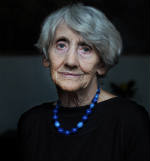Foto: Carlos París
HAMBRE
Tienen hambre
y han abierto
la boca.
Un árbol entero
podría colocarse
en ella
y un río
entero,
hasta unas montañas
con sus picos
y lomas.
Todo cabría
envuelto
en saliva,
en paños blancos.
La saliva
se estira
y ablanda el paisaje:
unas vacas pastan
en la profundidad
de su inocencia
y los caballos
sobre la barda
como estelas funerarias.
Piedad
para los que son
pasto y hueso
porque luego
serán triturados
por el deseo
bajo el cielo
incendiados,
y el ansia
y las paredes
del cosmos
se moverán
y el paisaje quedará guardado
en el saco ácido
de la desmemoria.
El deseo
de comer
lo incomible:
el perro fiel
calles y aceras,
edificios y trenes.
La hoguera de vidrio
de la pequeña ciudad
está encendida.
Devoración, devoración,
no importa cuánto
y cómo.
La hambruna,
la resaca súbita
del ánimo
una epidemia
masiva,
la voracidad
el ventoso remolino
de las aves carnívoras,
el entenebrecimiento.
CARRETERAS NOCTURNAS
AL cumplir los 35 años
me entregué con pasión
a las carreteras nocturnas, en ese tiempo viajaba
por el país imaginario
que todos construimos,
un país que me seguía como la única camisa azul
o el pañuelo
en el bolsillo izquierdo. Solía entonces
asomarme
a la ventanilla del autobús
y mirar en trance
la línea que segmenta
la mitad de la carretera, aquella línea
atravesada audazmente
por la pelambre de un zorro
o la sombra de una lechuza
escapada a la fijeza
de potentes faros,
o simplemente
el celaje
de una silueta
humana
huyendo de la fatalidad
y el arrollamiento.
El pasillo interno del autobús
era otro camino
de cuerpos contraídos
en posición fetal.
El ayudante del chofer
recorría aquel pasadizo
apoyándose en el espaldar
de los asientos
y mirando
al interior del sueño
de los viajantes.
Había silencio
y algún susurro de voces
era el esporádico acompañamiento
de aquellas horas.
El sueño que se vive
durante un viaje en autobús
produce fatiga de los sentidos:
debilidad nerviosa, psicastenia.
A los 35 años
ya era un viajero
por lugares de crápula y peligro,
y había descubierto algo
tan importante
como el destino familiar
esperado al término de la ruta.
Finalmente
atinaba con aquello
que parecía
una metáfora del país.
El novelista Enrique Bernardo Núñez
en Una ojeada al mapa de Venezuela
escribió esta frase:
Ante todo la tierra que tenemos delante reclama de nosotros una interpretación.
Deben ser como las 2 a.m.
y la proa del bus-cama
reduce la velocidad
estacionándose bajo el antetecho
de un restaurante de carretera.
Al abrirse las puertas del bus
nos desplegamos aturdidos
a la soledad de los urinarios,
al tragamonedas,
al pan y al café.
La luz del recinto
era blanca
como una niebla
que rozara la cabeza de los viajantes.
En la oscuridad
la carretera permanecía
–inmóvil–.
Sé que hay una ciudad cercana,
un bosque cercano
pero cómo relacionarlos
y armar con ellos
un universo.
El mapa del país
resulta inútil.
A pesar
de la certeza de la noche
si alguien preguntara:
¿qué día es,
de qué año y qué fecha?,
no sabría responderle.
Entonces, aquel momento estancado
en un presente continuo
me pareció tan semejante al país:
quiero decir que el país
es como los restaurantes nocturnos
de carretera.
Estas imágenes han resonado
durante años
como una onda que se expande
y no se disuelve.
Diría que es un lugar de amnesia.
Así también lo cree
un poeta antillano llamado Walcott.
La amnesia
es la visión de unas garzas
que posan a la orilla del mar
luego de un largo viaje.
La piedad llueve
sobre esta estampa
y no hay remedio.
Quién recuerda
una muerte ocurrida,
un pasado sepultado.
Con ojos calmos
releo –otra vez–
Una ojeada al mapa de Venezuela,
impreso por la editorial Élite en 1939:
A veces, al cruzar una aldea, veo casas abandonadas. El hombre se ha marchado de allí y ha cambiado sin dificultad el hogar por una reducida habitación en la ciudad fría.
En 1939
todavía se hablaba de la «hermosa barbarie»
mas hoy
las favelas acorazan
las montañas
con su muro de ladrillos anaranjados.
Es la maldita circunstancia
del presente por todas partes.
Ahora,
cuando el bus se aleja del restaurante
hay un momento en que la fachada
queda impresa
como un resplandor tenue
en el enorme vidrio lateral
de las ventanas.
No entiendo por qué evoco
un viaje a Grecia
y mi única visita
a la Acrópolis
y al teatro de Epidauro.
Mis ruinas
siempre han sido:
el óleo de una quieta montaña,
o la incandescencia
de la costa caribeña de Macuto.
Un país entrañable
que no volverá más.





